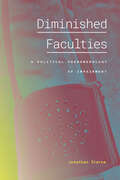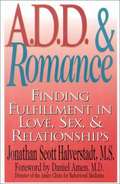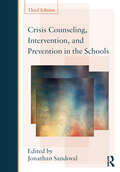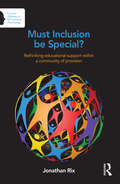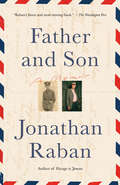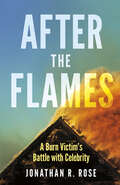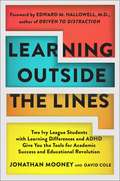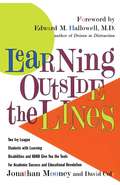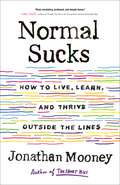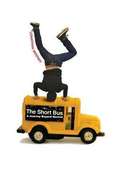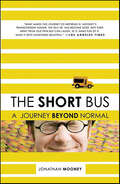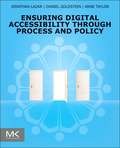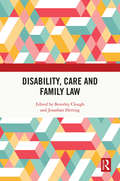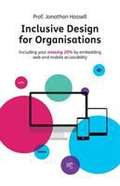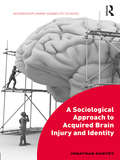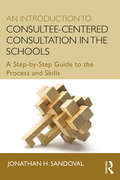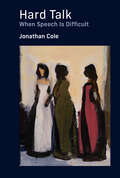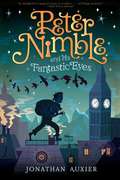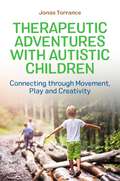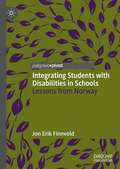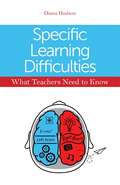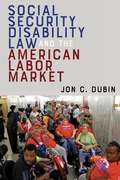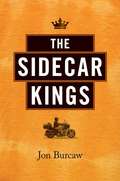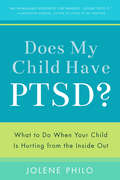- Table View
- List View
Diminished Faculties: A Political Phenomenology of Impairment
by Jonathan SterneIn Diminished Faculties Jonathan Sterne offers a sweeping cultural study and theorization of impairment. Drawing on his personal history with thyroid cancer and a paralyzed vocal cord, Sterne undertakes a political phenomenology of impairment in which experience is understood from the standpoint of a subject that is not fully able to account for itself. He conceives of impairment as a fundamental dimension of human experience, examining it as both political and physical. While some impairments are enshrined as normal in international standards, others are treated as causes or effects of illness or disability. Alongside his fractured account of experience, Sterne provides a tour of alternative vocal technologies and practices; a study of “normal” hearing loss as a cultural practice rather than a medical problem; and an intertwined history and phenomenology of fatigue that follows the concept as it careens from people to materials science to industrial management to spoons. Sterne demonstrates how impairment is a problem, opportunity, and occasion for approaching larger questions about disability, subjectivity, power, technology, and experience in new ways. Diminished Faculties ends with a practical user’s guide to impairment theory.
A.D.D. & Romance
by Jonathan Scott HalverstadtThis book examines what it is like to have ADD and be in a relationship.
Crisis Counseling, Intervention and Prevention in the Schools (Consultation, Supervision, and Professional Learning in School Psychology Series)
by Jonathan SandovalSince the first edition was published in 1988, the role of crisis intervention and prevention has become central to mental health professionals working in the schools. Disasters such as hurricane Katrina, terrorist attacks both in this country and around the world, and various school shootings have greatly increased school crisis research and policy development. This book is designed for an introductory graduate course taken by students in school psychology, school counseling, and school social work. Section I provides a crisis response overview, section II deals with crises for children and adolescents and section III covers crises that manifest in adolescence. Discussions of the 16 most prevalent types of crises are covered in sections II and III and include their characteristics, causes, interventions, and preventive programs. All chapters will be updated, six heavily revised or totally rewritten by new authors, and two new chapters (chapters 8 & 19) have been added.
Must Inclusion be Special?: Rethinking educational support within a community of provision (Current Debates in Educational Psychology)
by Jonathan RixMust Inclusion be Special? examines the discord between special and inclusive education and why this discord can only be resolved when wider inequalities within mainstream education are confronted. It calls for a shift in our approach to provision, from seeing it as a conglomeration of individualised needs to identifying it as a conglomeration of collective needs. The author examines the political, medical and cultural tendency of current times to focus upon the individual and contrasts this with the necessity to focus on context. This book distinguishes the theoretical perspectives that are often associated with special or inclusive education and the broad range of interests which depend upon their ongoing development. This examination leads to a problematisation of mainstream education provision, our understanding of why social inequities emerge and how additional support can overcome these inequities. Further chapters explore the underlying challenges which emerge from our use and understanding of the notions of special and inclusive, outlining an alternative approach based upon a community of provision. This approach recognises the interconnectedness of services and the significance of context, and it encapsulates the aspiration of much international legislation for participation and inclusion for all. But it also assumes that we tend towards diffuse practices, services, policies, settings and roles, spread across provision which is variously inclusive and exclusionary. In seeking to create equitable participation for all, support needs to shift its focus from the individual to this diffuse network of contexts. Must Inclusion be Special? emerges from the research base which problematises inclusion and special education, drawing upon examples from many countries. It also refers to the author’s research into pedagogy, language and policy, and his experiences as a teacher and the parent of a child identified with special educational needs.
Father and Son: A Memoir
by Jonathan RabanA NEW YORKER BEST BOOK OF THE YEAR • A poignant memoir of love, trauma, and recovery after a life-changing stroke, twinned to a powerful account of his father's experience in World War II, by a winner of the National Book Critics Circle Award.&“A beautiful, compelling memoir...Raban&’s final work is a gorgeous achievement.&” —Ian McEwan, New York Times best-selling author of Lessons In June 2011, just days before his sixty-ninth birthday, Jonathan Raban was sitting down to dinner with his daughter when he found he couldn&’t move his knife to his plate. Later that night, at the hospital, doctors confirmed what all had suspected: that he had suffered a massive hemorrhagic stroke, paralyzing the right side of his body. Once he became stable, Raban embarked on an extended stay at a rehabilitation center, where he became acquainted with, and struggled to accept, the limitations of his new body—learning again how to walk and climb stairs, attempting to bathe and dress himself, and rethinking how to write and even read.Woven into these pages is an account of a second battle, one that his own father faced in the trenches during World War II. With intimate letters that his parents exchanged at the time, Raban places the budding love of two young people within the tumultuous landscape of the war&’s various fronts, from the munition-strewn beaches of Dunkirk to blood-soaked streets of Anzio. Moving between narratives, his and theirs, Raban artfully explores the human capacity to adapt to trauma, as well as the warmth, strength, and humor that persist despite it. The result is Father and Son, a powerful story of mourning, but also one of resilience.
After the Flames: A Burn Victim's Battle With Celebrity
by Jonathan R. Rose“A fast-paced, compelling narrative that goes far beyond the headlines.” — KEVIN DONOVAN, author of The Billionaire MurdersFor Joey Philion, surviving the fire was only the beginning.On the morning of March 10th, 1988, in Orillia, Ontario, a house fire engulfed fourteen-year-old Joey Philion in flames. He suffered third degree burns on 95 percent of his body. Doctors didn’t think he would make it through the night.After the Flames is about one of the world's most famous burn victims: his incredible survival, his nightmarish path to recovery that helped revolutionize medical treatment for burn victims worldwide, the fame thrust upon him after he was declared a hero from the media, and the tumultuous years that followed, most of which were spent under the microscope of an unforgiving public eye.The story also follows Joey’s family, including his mother Linda, stepfather Mike, and younger brother Danny, all of whom endured their own tremendous hardships in the wake of a fire that changed their lives forever.
Learning Outside The Lines
by Edward M. Hallowell David Cole Jonathan Mooneyoward personal empowerment and profound educational change, proving once again that rules sometimes need to be broken.
Learning Outside The Lines: Two Ivy League Students With Learning Disabilities And Adhd Give You The Tools F
by Edward M. Hallowell David Cole Jonathan MooneyLearning with YOUR purpose in mind -- not your parents', not your teacher's, not your school's Every day, your school, your teachers, and even your peers draw lines to measure and standardize intelligence. They decide what criteria make one person smart and another person stupid. They decide who will succeed and who will just get by. Perhaps you find yourself outside the norm, because you learn differently -- but, unlike your classmates, you have no system in place that consistently supports your ability and desire to learn. Simply put, you are considered lazy and stupid. You are expected to fail. Learning Outside the Lines is written by two such "academic failures" -- that is, two academic failures who graduated from Brown University at the top of their class. Jonathan Mooney and David Cole teach you how to take control of your education and find true success -- and they offer all the reasons why you should persevere. Witty, bold, and disarmingly honest, Learning Outside the Lines takes you on a journey toward personal empowerment and profound educational change, proving once again that rules sometimes need to be broken.
Learning Outside the Lines: Two Ivy League Students With Learning Disabilities and ADHD Give You the Tools for Academic Success and Educational Revolution
by David Cole Jonathan MooneyEvery day, your school, your teachers, and even your peers draw lines to measure and standardize intelligence. They decide what criteria make one person smart and another person stupid. They decide who will succeed and who will just get by. Perhaps you find yourself outside the norm, because you learn differently -- but, unlike your classmates, you have no system in place that consistently supports your ability and desire to learn. Simply put, you are considered lazy and stupid. You are expected to fail. Learning Outside the Lines is written by two such "academic failures" -- that is, two academic failures who graduated from Brown University at the top of their class. Jonathan Mooney and David Cole teach you how to take control of your education and find true success -- and they offer all the reasons why you should persevere.
Normal Sucks: How to Live, Learn, and Thrive Outside the Lines
by Jonathan MooneyConfessional and often hilarious, in Normal Sucks a neuro-diverse writer, advocate, and father meditates on his life, offering the radical message that we should stop trying to fix people and start empowering them to succeedJonathan Mooney blends anecdote, expertise, and memoir to present a new mode of thinking about how we live and learn—individually, uniquely, and with advantages and upshots to every type of brain and body. As a neuro-diverse kid diagnosed with dyslexia and ADHD who didn't learn to read until he was twelve, the realization that that he wasn’t the problem—the system and the concept of normal were—saved Mooney’s life and fundamentally changed his outlook. Here he explores the toll that being not normal takes on kids and adults when they’re trapped in environments that label them, shame them, and tell them, even in subtle ways, that they are the problem. But, he argues, if we can reorient the ways in which we think about diversity, abilities, and disabilities, we can start a revolution.A highly sought after public speaker, Mooney has been inspiring audiences with his story and his message for nearly two decades. Now he’s ready to share what he’s learned from parents, educators, researchers, and kids in a book that is as much a survival guide as it is a call to action. Whip-smart, insightful, and utterly inspiring—and movingly framed as a letter to his own young sons, as they work to find their ways in the world—this book will upend what we call normal and empower us all.
The Short Bus: A Journey Beyond Normal
by Jonathan MooneyA young man once called unteachable journeys across America to investigate the lives of those, like himself, who are forced to create new ways of living in order to survive Labeled "dyslexic and profoundly learning disabled with attention and behavior problems," Jonathan Mooney was a short bus rider--a derogatory term used for kids in special education and a distinction that told the world he wasn't "normal. " Along with other kids with special challenges, he grew up hearing himself denigrated daily. Ultimately, Mooney surprised skeptics by graduating with honors from Brown University. But he could never escape his past, so he hit the road. To free himself andto learn how others had moved beyond labels, he created an epic journey. He would buy his own short bus and set out cross-country, looking for kids who had dreamed up magical, beautiful ways to overcome the obstacles that separated them from the so-called normal world. InThe Short Bus, his humorous, irreverent, and poignant record of this odyssey, Mooney describes his four-month, 35,000-mile journey across borders that most people never see. He meets thirteen people in thirteen states, including an eight-year-old deaf and blind girl who likes to curse out her teachers in sign language. Then there's Butch Anthony, who grew up severely learning disabled but who is now the proud owner of the Museum of Wonder. These people teach Mooney that there's no such thing as normal and that to really live, every person must find their own special ways of keeping on. The Short Bus is a unique gem, propelled by Mooney's heart, humor, and outrageous rebellions.
The Short Bus: A Journey Beyond Normal
by Jonathan MooneyA young man once called unteachable journeys across America to investigate the lives of those, like himself, who are forced to create new ways of living in order to surviveLabeled "dyslexic and profoundly learning disabled with attention and behavior problems," Jonathan Mooney was a short bus rider—a derogatory term used for kids in special education and a distinction that told the world he wasn't "normal." Along with other kids with special challenges, he grew up hearing himself denigrated daily. Ultimately, Mooney surprised skeptics by graduating with honors from Brown University. But he could never escape his past, so he hit the road. To free himself and to learn how others had moved beyond labels, he created an epic journey. He would buy his own short bus and set out cross-country, looking for kids who had dreamed up magical, beautiful ways to overcome the obstacles that separated them from the so-called normal world.In The Short Bus, his humorous, irreverent, and poignant record of this odyssey, Mooney describes his four-month, 35,000-mile journey across borders that most people never see. He meets thirteen people in thirteen states, including an eight-year-old deaf and blind girl who likes to curse out her teachers in sign language. Then there's Butch Anthony, who grew up severely learning disabled but who is now the proud owner of the Museum of Wonder. These people teach Mooney that there's no such thing as normal and that to really live, every person must find their own special ways of keeping on. The Short Bus is a unique gem, propelled by Mooney's heart, humor, and outrageous rebellions.
Ensuring Digital Accessibility through Process and Policy
by Jonathan Lazar Anne Taylor Daniel GoldsteinThis book provides readers with a resource to digital accessibility from both a technical and policy perspective.
Disability, Care and Family Law
by Jonathan Herring Beverley CloughThis book explores the series of issues that emerge at the intersection of disability, care and family law. Disability studies is an area of increasing academic interest. In addition to a subject in its own right, there has been growing concern to ensure that mainstream subjects diversify and include marginalised voices, including those of disabled people. Family law in modern times is often based on an "able-bodied autonomous norm" but can fit less well with the complexities of living with disability. In response, this book addresses a range of important and highly topical issues: whether care proceedings are used too often in cases where parents have disabilities; how the law should respond to children who care for disabled parents – and the care of older family members with disabilities. It also considers the challenges posed by the UN Convention on the Rights of Persons with Disabilities, particularly around the different institutional and state responsibilities captured in the Convention, and around decision-making for both disabled adults and children. This interdisciplinary collection – with contributors from law, criminology, sociology and social policy as well as from policy and activist backgrounds – will appeal to academic family lawyers and disability scholars as well as students interested in issues around family law, disability and care.
Inclusive Design For Organisations: Including Your Missing 20% By Embedding Web And Mobile Accessibility
by Jonathan HassellMost organisations are oblivious to, or terrified about, web accessibility. <p><p> You may be aware that 20% of your customers - people with disabilities - could be clicking away from your websites or mobile apps every day, without having bought anything or found the information they needed. You may have received complaints about accessibility problems you don't understand, with people asking for what seem like impossible fixes. Your web teams may have read the industry standard WCAG guidelines, but found them impenetrable. You probably know you could be sued if you don't do the right thing, but you don't know how far you need to go to prevent that. And apart from eliminating risk, what else is in it for your organisation? <p> In this book, award-winning international accessibility thought-leader Jonathan Hassell shows you how to transform your organisation to consistently and cost-efficiently create websites, mobile apps and other digital products that are usable for all of your customers. <p> Inclusive Design for Organisations gives you a clear, strategic business-aligned framework how to embed accessibility policies and processes consistently throughout your organisation, and how to measure the return on your investment. <p> With insights from leading worldwide accessibility experts who have implemented these processes in their organisations, this book comes with a free library of downloadable support tools, templates, podcasts and videos to help you on your journey to accessibility maturity. <p> Inclusive Design for Organisations, and its companion, Inclusive Design for Products, will help you comply with both parts of the new International Standard ISO 30071-1.
A Sociological Approach to Acquired Brain Injury and Identity (Interdisciplinary Disability Studies)
by Jonathan HarveyInspired by the author’s personal experience of sustaining acquired brain injury (ABI), this path-breaking book explores the (re)construction of identity after ABI. It offers a way of understanding ABI through a social scientific lens, promoting an understanding that is generated through close engagement with the lives and experiences of ABI survivors. The author follows the everyday experiences of six male survivors and critically investigates their identity (re)construction after their ABI. As well as demonstrating identity (re)construction after ABI, the experiences of the participants allow the reader to investigate neurological rehabilitation from their perspective. This book suggests that rehabilitation after ABI is often a continual process that extends beyond the formal, medically prescribed period. It also shows that identity after ABI is often (re)constructed in an unpredictable way; a way that emphasises the importance of reciprocal support and the uncertainty of future life. A Sociological Approach to Acquired Brain Injury and Identity is essential reading for academics and students from a range of social scientific disciplines with an interest in biographical or ethnographic research methods. This book offers a social scientific view of rehabilitation and as such is also essential reading for academics, students and professionals with an interest in health and illness, particularly neurological rehabilitation and brain injury rehabilitation.
An Introduction to Consultee-Centered Consultation in the Schools: A Step-by-Step Guide to the Process and Skills (Consultation, Supervision, and Professional Learning in School Psychology Series)
by Jonathan H. SandovalDrawing on historical writings about mental health consultation and on contemporary research and theory, Jonathan Sandoval lucidly explains the consultee-centered approach to consultation. The book provides an expert foundation on which to build a training program for future school-based consultants. Written for graduate students in school psychology, counseling psychology, special education, and social work, this book is an invaluable resource for mental health professionals working in schools who wish to upgrade their professional skills and grow as reflective practitioners. Individual chapters describe different stages in the consultation process; outline the processes characterized in each stage; detail useful consultant skills; review pertinent research; discuss the ethical principles underlying practice; and suggest self-monitoring questions for student consultants. Featuring a step-by-step developmental model of the consultee-centered consultation process, this book encourages consultants to prioritize those characteristics that contribute to a consultee’s work difficulty, in addition to assessing the client more generally. By detailing this unique approach, this concise volume provides an applicable, contextualized, and strategic form of consultation, and fosters a professional-to-professional relationship distinguishable from supervision, counseling, therapy, coaching or other methods.
Hard Talk: When Speech Is Difficult
by Jonathan ColeA moving, patient-centered portrait of the social importance of speech, from a medical expert known for his humanizing explorations of health.Language comes to us through culture, environment, and family. Words embed over time, as we use our minds to comprehend them and then our mouths to say, mean, and own them. Without the ability to speak, or when talking becomes difficult, we face a challenge like few others, forced to reconnect with a world that assumes its communicators are eloquent vocally. In Hard Talk, Jonathan Cole takes a necessary look at the privilege of speech so we can better accommodate those for whom it presents problems. Cole creates space for people with a variety of conditions, including cerebral palsy, vocal cord palsy, cleft palate, Parkinson&’s, and post-stroke aphasia, to describe in their own words what the experience of difficult speech is like. No struggle is the same. Each develops along its own axis of factors—cognitive, social, and physical—that lead to unique vulnerabilities as well as extraordinary moments of adaptation and resilience. One person finds social chatter becoming more problematic than work speech. Another grows alarmed as changes in speech begin to constrain inner thoughts. Some lose the ability to find or make words though they retain awareness, while others lose self-awareness but maintain fluent speech bereft of meaning. One even loses the ability to speak with family while continuing to interact at work.Hard Talk reacquaints us with the social power of speech while affirming the humane value of listening. Cole also reflects on the neuroscientific advances we&’ve made in understanding barriers to speech and how we might reduce them.
Peter Nimble and His Fantastic Eyes
by Jonathan AuxierRaised to be a thief, blind orphan Peter Nimble, age ten, steals from a mysterious stranger three pairs of magical eyes that lead him to a hidden island where he must decide to become a hero or resume his life of crime.
Therapeutic Adventures with Autistic Children: Connecting through Movement, Play and Creativity
by Jonas TorranceA vivid exploration of working with autistic children using empowering techniques from a range of creative therapies. Each chapter in this heartening book is the story of a child with autism and how therapy was pivotal in confronting his or her individual dilemma. Covering many of the behaviours characteristic to autism, such as uncontrolled anger and obsessive tendencies, the therapies used range from drawing and dancing to meditation and martial arts, depending on the needs and interests of each child. The key message is that investing in the relationship between the therapist and the child - so that they grow, play and develop together - is transformative.
Integrating Students with Disabilities in Schools: Lessons from Norway
by Jon Erik FinnvoldThis book explores the ability of the Norwegian school system to support the achievement of formal competencies among children with physical disabilities, as well as its role in the informal dimensions of social participation and networking. Schools contribute to social inclusion in several ways: they are arenas for building official competencies, ensuring future access and success in the labour market. They are also sites for meeting other children, and developing friendships – friendships are not only important for strengthening cognitive development, but are vital to both good mental health and the building of various forms of social capital. By examining schools and the ways in which inclusion is incorporated early, this book aims to bridge the opportunity and employment gap that people with physical disabilities are more likely to face later in life.
Specific Learning Difficulties - What Teachers Need to Know
by Diana Hudson Jon EnglishThis book clearly explains what Specific Learning Difficulties (SpLD) are, and describes the symptoms of conditions most commonly encountered in the mainstream classroom: dyslexia, dyspraxia, dyscalculia, dysgraphia, Autism Spectrum Disorder, ADHD, and OCD. The author provides an overview of the strengths and weaknesses commonly associated with each of these conditions, as well as practical suggestions for modifying teaching materials and methods to make learning enjoyable, effective and accessible for students. There are also dedicated chapters on helping students with SpLDs to develop effective revision skills and exam techniques. This straight-talking and accessible guide is ideal for teachers, teaching assistants, and those in school management who want to know more about supporting students with Specific Learning Difficulties.
Social Security Disability Law and the American Labor Market
by Jon C. DubinHow social security disability law is out of touch with the contemporary American labor market Passing down nearly a million decisions each year, more judges handle disability cases for the Social Security Administration than federal civil and criminal cases combined. In Social Security Disability Law and the American Labor Market, Jon C. Dubin challenges the contemporary policies for determining disability benefits and work assessment. He posits the fundamental questions: where are the jobs for persons with significant medical and vocational challenges? And how does the administration misfire in its standards and processes for answering that question? Deploying his profound understanding of the Social Security Administration and Disability law and policy, he demystifies the system, showing us its complex inner mechanisms and flaws, its history and evolution, and how changes in the labor market have rendered some agency processes obsolete. Dubin lays out how those who advocate eviscerating program coverage and needed life support benefits in the guise of modernizing these procedures would reduce the capacity for the Social Security Administration to function properly and serve its intended beneficiaries, and argues that the disability system should instead be “mended, not ended.”Dubin argues that while it may seem counterintuitive, the transformation from an industrial economy to a twenty-first-century service economy in the information age, with increased automation, and resulting diminished demand for arduous physical labor, has not meaningfully reduced the relevance of, or need for, the disability benefits programs. Indeed, they have created new and different obstacles to work adjustments based on the need for other skills and capacities in the new economy—especially for the significant portion of persons with cognitive, psychiatric, neuro-psychological, or other mental impairments. Therefore, while the disability program is in dire need of empirically supported updating and measures to remedy identified deficiencies, obsolescence, inconsistencies in application, and racial, economic and other inequities, the program’s framework is sufficiently broad and enduring to remain relevant and faithful to the Act’s congressional beneficent purposes and aspirations.
The Sidecar Kings
by Jon BurcawAuthor Jon Burcaw draws out the relationship between wheelchairs and motorcycles. He refers to his life experience as a motorcycle lover and his son's as a disabled child.
Does My Child Have Ptsd?: What to Do When Your Child Is Hurting from the Inside Out
by Jolene PhiloA mother, advocate, and educator shares research and personal experience in this guide to help anyone care for children dealing with PTSD.Is it possible that the struggles you have with your child may be because he or she suffers from post-traumatic stress disorder (PTSD)? Once ignored, even by the medical professionals treating war veterans, PTSD is gaining global recognition as a very real and serious issue for those who have experienced traumatic events, even children. When children experience medical illness, witness violence, or are abused, it can leave a lasting effect. According to recent studies, 50 to 60 percent of children who experience these traumas early in life may suffer from a form of PTSD, leading to issues in childhood, through adolescence, and even into adulthood. Does My Child Have PTSD? is designed for readers looking for answers about the puzzling, disturbing behaviors of children in their care. With years of research and personal experience, Philo provides critical information to help people understand causes, symptoms, prevention, and effective diagnosis, treatment, and care for any child struggling with PTSD. “Philo’s dramatic story will capture the reader's attention, and there’s tremendous value in her patient explanations, from a simple definition of trauma to an exploration of PTSD causes, myths, and common terminology. . . . Though occasionally heart-wrenching, the book is organized so simply and logically as to be easy to follow and digest. Each chapter ends with “reflection questions” and additional valuable resources. Philo concludes on a hopeful note, providing encouragement and reassurance for other families in similar situations.” —Publishers Weekly, Starred Review
